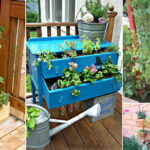The intersection of childhood development and gardening practices presents an intriguing area for investigation. Engaging children in gardening fosters not only a connection with nature but also cultivates life skills that are essential in the modern world. The question of the optimal age to begin this horticultural journey with children is paramount, as it intertwines developmental milestones with experiential learning. This article delves into the multifaceted aspects of introducing gardening to children, exploring age-appropriate activities that promote a sense of responsibility, knowledge acquisition, and emotional growth.
Gardening as a Developmental Tool
Understanding child development is crucial for determining the right age to introduce gardening. Each stage of a child’s growth presents unique opportunities for learning and engagement. From infancy to adolescence, various gardening activities can be tailored to suit developmental capabilities.
Early Childhood (Ages 2-5): Nurturing Curiosity
At this tender age, children are typically bursting with curiosity. Differentiating between right and wrong, understanding basic concepts, and developing fine motor skills are all burgeoning endeavors. Gardening offers a sensory-rich environment that captivates their interest. Simple tasks such as digging in the soil or watering plants can be extraordinarily fulfilling. The tactile experience of feeling the earth and observing plants grow fosters an innate curiosity about life cycles.
Furthermore, involving toddlers in gardening can be seen as a delightful introduction to responsibility. They learn to care for another living being, even if it is as simple as throwing seeds on the ground or gently planting seedlings. Their spontaneous nature is suited well to garden play, making this stage an opportune time for experimentation and exploration. It is essential, however, to guide them gently, ensuring that these early experiences are positive and rewarding.
Middle Childhood (Ages 6-12): Expanding Horizons
As children transition into middle childhood, their cognitive abilities expand exponentially. This period is characterized by a desire for independence, a deeper understanding of concepts, and the ability to engage in more complex tasks. Integrating gardening during these formative years can significantly impact their development.
Children aged 6 to 12 possess the capacity to understand the mechanics of gardening, from the importance of nutrients to the effects of sunlight. They can engage in more structured activities, such as planning a garden layout, learning about different plant species, and even participating in composting efforts. These tasks harness both critical thinking and problem-solving skills, subsequently enhancing their academic competence in subjects such as science and mathematics.
Moreover, this age group is particularly adept at understanding cause-and-effect relationships. When children witness the outcomes of their actions—such as the result of over-watering or failing to provide sufficient sunlight—they learn valuable lessons about stewardship and consequences. It can also act as a social activity, providing opportunities for teamwork and cooperation with peers, thus fostering social-emotional growth.
Adolescence (Ages 13-18): Cultivating Leadership
During adolescence, the focus shifts dramatically toward self-identity and personal interests. By this stage, gardening can assume a more nuanced and sophisticated role. Teens not only have the capability to lead projects but also to engage in meaningful conversations about sustainability, nutrition, and environmental stewardship. Gardening can become a vehicle for activism, as teenagers often seek outlets for their values and beliefs.
Encouraging adolescents to start their own gardening initiatives, whether it involves creating a vegetable garden for their family or participating in community projects, can be empowering. This phase is vital for developing a sense of ownership and accountability. Teens learn about the implications of their choices on the environment while cultivating skills such as leadership, project management, and teamwork.
Challenges and Considerations
Despite the myriad advantages of gardening, several challenges can arise depending on age. It is essential to address these challenges thoughtfully to ensure continual engagement. For very young children, the risk of losing interest quickly must be mitigated. Short, impactful bursts of activity yielding immediate results can help maintain their enthusiasm.
As children grow older, parents and educators must also be aware of the potential for disinterest due to external distractions. Balancing the allure of technology with the great outdoors can be complicated. However, integrating gardening with technological tools—such as using apps for plant identification or logging their growth progress—can make gardening relatable and exciting for tech-savvy adolescents.
Connecting Gardening to Core Educational Goals
Aligning gardening experiences with educational frameworks enhances its effectiveness as a tool for learning. The value of experiential learning is increasingly recognized in curricula across subjects, particularly as initiatives centered around environmental education gain traction.
Gardening can be integrated into lessons on biology, ecology, and even history. For instance, understanding photosynthesis could be practically demonstrated by engaging in hands-on activities that illustrate energy transfer within a garden ecosystem. Similarly, exploring the nutritional aspects of gardening can encourage discussions on health, enabling children to make informed dietary choices.
Moreover, there are significant opportunities for cross-disciplinary projects that connect gardening with art and literature. Children can document their gardening experiences through drawings, photographs, or journaling, thus providing an avenue for creative expression while solidifying their learning.
The Long-term Impact of Gardening in Childhood
The long-lasting impacts of early gardening experiences can extend far beyond childhood. A growing body of research suggests that children who engage in gardening tend to develop a greater appreciation for nature. They may carry these values into adulthood, contributing to a lifetime of environmental stewardship. Moreover, gardening promotes healthy habits, as children learn about food production and nutrition early on, potentially combating detrimental dietary trends.
In conclusion, the right age to start gardening with kids is less about a specific number and more about developmental readiness and engagement potential. By assessing the unique abilities and interests of each child, guardians and educators can create tailored gardening experiences that are both educational and enjoyable. Gardening can be seen as a profound metaphor for growth—nurturing young minds, fostering resilience, and cultivating a generation that is mindful of their relationship with the natural world. It beckons a playful challenge: how will you cultivate these precious seeds of potential, and transform them into a flourishing garden of understanding and responsibility?








Leave a Comment